- Home
- Gary Vaynerchuk
Crush It! Page 3
Crush It! Read online
Page 3
* * *
Storytelling is by far the most underrated skill in business.
* * *
The wine buyers, unlike the liquor customers, were open to any suggestions I had, and I realized that they represented opportunity. Spotting that social trend was enough to turn what started out as a casual interest in wine into an obsession. I had started out at Shopper’s Discount Liquors hating every second of my time there, but now I was determined to turn the place into the number one wine shop in America.
changing the wine world
No one had any illusions that I was a great scholar as I started my senior year of high school, so it made sense to me that my plan should be to eke out the grades to graduate and start working full-time at the liquor store. Some time in February…yes, February (sorry, Mom, you know it’s true)…my mother asked me what college I was planning to attend. College? As luck would have it, a postcard from Mount Ida College in Newton, Massachusetts, showed up in the mail a few days later. I filled it out, and Mount Ida became my home in the fall. By then, though, my life was the store, and I’d come home almost every weekend to work there.
In September 1995, I was hanging out in a friend’s dorm room when he turned on his computer and introduced me to this thing called the Internet. I let my friends bumble around chat rooms trying to meet girls for a little while, then kicked them off and spent the next nine hours hunting down baseball card trading forums and figuring out how I was going to use this thing to grow the store. There was no doubt in my mind this was going to be the future of business. It would take me another year to get the courage to approach my dad about selling wine online. What can I say, my dad was a scary guy. At first he resisted. But he believed in me, and as soon as he relented I was off to the races.
Winelibrary.com launched in June 1997 (the store itself wouldn’t take on the name Wine Library until 1999). The store brought in about 2 or 3 million per year in 1994. I came onboard full-time after graduating in 1998 and grew the business from about 4 million to 10 million in a year with 0 percent of that in online sales. By 2001, we were doing about 20 million. Not bad. Not bad at all. Life was good and business was booming. Most guys my age would have thought they had it made.
Then, on my thirtieth birthday, November 14, 2005, I was driving along the New Jersey Turnpike on my way to work thinking about my day, and I realized that as perfect as life seemed, I wasn’t entirely happy. I knew deep in my soul that there was no way I was ever going to buy the Jets if I stayed on the retail path. It was time to go big.
We had a computer department at Wine Library by now, and I had seen Erik Kastner and John Kassimatis spending their lunch breaks spitting food all over themselves from laughing at these things called video blogs (the two big ones at the time were Rocketboom and the show with zefrank). I had been trying to figure out how to leverage this new medium to show people that there was more to drink out there than Yellowtail. I’d also noticed that sites like MySpace and Flickr and YouTube were becoming popular, sites that had nothing to do with commerce and everything to do with being social and sharing stories and meeting people, and that was something I was good at. It was there, on the New Jersey Turnpike, that I had my aha moment. I wasn’t going to use video blogs to sell wine; I was going to use video blogs to build a whole new world for wine, and for myself. I waited to get the store through the holiday season, and then launched Wine Library TV in February 2006, three months later.
three
build your personal brand
You’ve just read a piece of my story that most people don’t know, and it’s probably the most important part. I’ll say it again: Wine Library TV was never about selling wine on the Internet. It was always about building brand equity.
* * *
Some people might point out that if I weren’t interested in selling wine, I wouldn’t include links to buy it on the Wine Library TV site. Believe me, I’d make more money doing an affiliate program with Wine.com than I do with my links to Winelibrary.com. But I’m a businessman—if someone wants to buy wine from me, be my guest. However, so that no one can accuse “The Thunder Show” (my nickname for Wine Library TV) of being an extended sales pitch, I make sure that Wine Library only carries fifteen or fewer cases of whatever I talk about. If I give something a good review and it sells out, everyone has to go elsewhere to get it. If the goal of Wine Library TV were to sell wine, I’d make sure to have enough product on hand to serve my customers. Wine Library, our store, doesn’t reap commercial benefits from Wine Library TV because of an uptick in sales due to my blog; it reaps brand equity benefits because people come to the store to see what it’s about and where I work. Sometimes they just come to thank me for the content on my blog, which I really, really appreciate.
* * *
Developing your personal brand is key to monetizing your passion online. Whether you’re delivering your content by video, podcast, or blog, it’s the authentic you, the one thing that is guaranteed to differentiate you from everybody else, including those who share your niche or business model. The thing that most people don’t realize is that in today’s world your business and your personal brand need to be one and the same, whether you’re selling organic fish food or financial advice or just your opinion.
Monetizing a personal brand is not a new concept. A lot of the most successful entertainment figures in the world are personal brand geniuses, like Oprah, Howard Stern, and Emeril. They built their empires out of being who they are and never backing down from it. But the major benefits of personal branding are not limited to the A-list celebrities. In fact, personal branding is what gives everyone an unprecedented shot at joining their ranks. For example, think about what some people might consider second-tier celebrities like Ashton Kutcher or Kerry Rhodes. Kutcher was already famous from his stints on television, not to mention his marriage to Demi Moore, but there is no doubt that his brand has blown up since he started leveraging social networking tools. Rhodes, the New York Jets football player, has been using Twitter with incredible success to make his brand bigger. D-to-C-level entertainment figures like Will Wheaton, Brooke Burke, Levar Burton, and Fred Durst are building great opportunities that will likely propel them from B- to A-level status. How do I know? Because I can see how many people are following them on their Twitter accounts. Now, usually I advise people to ignore the quantity of people following them and focus instead on the quality of their interactions with those followers—it’s a lot more indicative of how well their brand is doing. Many decision makers, however, still aren’t aware of this important detail, and therefore the preceding celebrities will benefit from those nice numbers we’re seeing. Where the eyeballs go, opportunity follows.
Last, but by no means least, are the people whom you might have never heard of who are putting out great content and leveraging social media and killing it, like Dave Morin @davemorin, Chris Sacca @sacca, Justine Ezarik @ijustine, and Kevin Rose @ kevinrose. Their personal brands are skyrocketing, and there’s no reason to think that eventually they won’t become household names.
You see where I’m going with this? The first generation built their brands on television and movie screens, radio, magazines, and newspapers, and the new one will do the same online at a much lower cost, with no need for a gatekeeper’s approval. Get into position, because the big killing is coming around the corner. The field may be different, but the game is just the same.
building my brand
If you watch me on Winelibrarytv.com, you’ll figure out my personal brand pretty quickly. I’m the wine guy who tells it like it is in plain English. It’s a brand that I’ve been able to develop from a very early age, thanks to growing up in the wine industry. I’d attend $1,000-a-head tastings and rub elbows with experienced connoisseurs who had lived a long time in the wine trenches. This meant that they had lots of expertise to share with a relative newcomer like me. It also meant that they carried a load of baggage in the form of preconceived notions of how things should be.
They’d swirl and smell and slurp and spit and then spout the same classic terminology every time, how the bouquet was rose petals or the finish was silk. I would stick my nose in my glass, suck in a mouthful of air and wine, and the only thing running through my head would be, “Man, this really tastes like Big League Chew,” or, “If this isn’t a Whatchamacallit bar, I don’t know what is.” It’s not that I couldn’t spout an A-to-Z wine-tasting lexicon and didn’t appreciate the complexity of an excellent vintage. I knew my Malbec from my Montepulciano; I just didn’t see why I had to use the same forty-five-cent words to describe my experience when drinking it. On top of that, everyone, including the reviewers, was drinking and admiring the same damn stuff. If Cloudy Bay Sauvignon Blanc were featured as the best white of 1998, we’d see a surge in demand for it at the store. Never mind that as far as I was concerned the Babich was a million times better and a better deal since it cost about half the price.
It was clear to me that the industry was stuck in a rut, and my experience in the store told me that people were dying for someone to take the mystery out of wine buying and make it fun. And I thought, this I can do. So I became the wine guy, and that’s how I built my personal brand, not with wine per se. I offer my personal brand, not wine, on Wine Library TV. Every episode gives me a chance to share my considerable expertise with other people interested in the same thing I am, which is loads of fun. They also give me a chance to share myself. Watch me for two seconds and you know exactly who I am and what I stand for. Authenticity is key.
Now, that can definitely be a double-edged sword. I know there are people out there who think I’m a jerk with my Jets spit bucket, my table littered with toys, and my colorful language. I’m loud, I’m over the top, I’m hyper. But I am who I am. I’m for real, and overall people like that. People watch, and they listen, and they even learn a thing or two and sometimes agree with me that hell yes, this Reisling does taste like a racquetball. I give wine lovers the permission to like any kind of wine they like, whether it’s White Zinfandel or serious Bordeaux.
I cultivated another brand too, of course, the one that got me this book deal and the keynote speeches and the consulting gigs, as well as helped me and my brother, AJ, build VaynerMedia. For almost two years I was patient. I let people get to know me and trust my wine guy personal brand. Then in October 2007, I decided I needed to scratch my itch. The world was ready to know that I was more than the funny guy who knows a lot about wine. I woke up one morning and thought, It’s time to talk biz, and I started airing videos of me talking about my real passion, building brands and business.
Regardless of which brand people are drawn to, my popularity stems from the fact that I know what the hell I’m talking about, and that I’m honest. For all my charisma and entertainment value, if the content I was putting out wasn’t any good and couldn’t be trusted, no one would be watching. No one.
* * *
To everyone who is freaking out because they fear the noise and distraction of all the additional content on the Internet, you can relax. Quality is a tremendous filter. Cream always rises, my friends, no matter how many cups of coffee you pour.
* * *
opportunity lies in transparency
Consumers want you to tell them the truth. Sure, they want quality and service and value and entertainment, but above all they want to know that the person they’re dealing with is being honest. Entrepreneurs don’t really have a choice—the lines between the private and the public are becoming increasingly blurred, and with people able to share their experiences and thoughts and photographs on video by spraying them all over the Internet within minutes after they happen, the days of being able to con the consumer without repercussions are pretty much over. So no matter how you shape and color your personal brand, honesty has got to be at your core.
I come online five days a week to taste and review wines. Some wines are tremendous, some taste like horse crap. Do the makers of the wines I pan like me? Probably not. Do I care? Nope. Do I sell some of the ones that I think taste bad? You bet I do, because you might totally disagree with me (someone at the winery who made them sure did). All I’m doing on my blog is being myself and voicing my opinion loud and clear. When you launch your videos, blogs, or podcasts, you’re going to do the same. That goes for everyone, including those of you who are used to keeping information close to the vest, or you will lose, one way or another.
Let’s say you’re in real estate and you love it. Part of the real-estate game is learning to put some serious spin on a loser property, right? You pitch it as a “charming fixer-upper” or a gem “just waiting for some TLC.” Even the appealing properties get the rose-colored treatment. But what if you sat down in front of a camera and posted a series of video blogs telling people what you really thought of the homes or commercial sites or lots you were selling? What if you said something like, “I have got one ugly house to sell. Seriously, folks, you’ve got to see this one if only to take in one of the last surviving examples of red shag carpeting matched with faux-deer-antler, woodland-creature chandeliers. The sellers are supernice and I would love to get them the $360K they originally wanted, but I’ve talked to them about it and they understand that they need to set their sights lower because this sucker needs some serious renovations. I’m thinking you should take a look at it if you’ve got about $275K to spend, plus some extra bucks for a contractor. And bring your imagination. Lots of it.”
Now, I know there are laws in real estate that might make it hard to execute this idea. Clearly, I was pushing the limits in the last paragraph. But would that kind of transparency hurt your business? Maybe at first you’d have a hard time getting sellers to list with you. But imagine what kind of coin you’d earn if you became the most trusted real-estate agent in town because no one would ever doubt that you’d try to sell them a house you didn’t think was worth every dime for which you were asking? Your listings would go up because sellers would be confident their properties weren’t going to gather dust on the market, your sales would go up because buyers would know they weren’t going to have to deal with any bs. On top of that, you’d have the satisfaction of doing something you loved entirely your way. And on top of that, you’d have built a solid personal brand—the no-bs real-estate agent—that you can now carry with you wherever you go and use as leverage to find bigger and better professional opportunities, including book-writing gigs, television appearances, and a variety of other media appearances. Do it. Do it right now.
* * *
One real-estate agent who is building a powerful online personal brand is Ian Watt at www.ianwatt.ca. Every video blog he launches as he drives around the streets of Vancouver, where he’s based, dispenses Ian’s thoughts on the real-estate business and the state of the market or offers general advice to property buyers and sellers. He’s lively, he’s knowledgeable, and he’s crushing it big-time.
* * *
trust your own palate
When you’re thinking about your personal brand, don’t worry that it will have to look anything like mine in order for you to crush it. You’ll crush it as long as you concentrate on being yourself. Besides, you can’t be like me. I like wines that you don’t. I like White Castle and the New York Knicks, and you probably don’t. I’d rather drink a V8 than any fruit juice, and I hoover my veggies. All of those quirks and preferences have shaped my brand. Your brand will be unique and interesting because you are unique and interesting. Don’t put on an act to try to imitate me or anyone else who’s had some success with social marketing. You will lose because people can sniff out a poser from a mile away. I had to wait a long time to find a platform that allowed me to create and share an authentic personal brand. Before I launched Wine Library TV, I saw that blogs were on the rise and I knew there was opportunity there and was desperate to get in on it. But I looked in the mirror and asked, “Can you write? No…Damn!”* Now, I could have hired someone to write elegant blog posts for me and pretended they were mine (note to some celebri
ties I won’t name: I love you but cut that out, we know you’re not writing those tweets on Twitter yourself), but I knew that if I was going to get people interested in me, everything was going to have to come straight from me, unfiltered and unpolished. Creating and disseminating my content would be the only thing that I absolutely could not and would not delegate. Besides, if I was going to spend the time building a gazillion-dollar business so that I could buy the Jets, I had to do it in a way that was authentically me and that I couldn’t wait to do every day. So I waited until I found a medium that spoke to my DNA—video blogs—jumped on it, and never looked back.

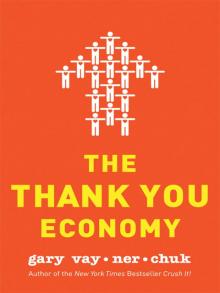 The Thank You Economy
The Thank You Economy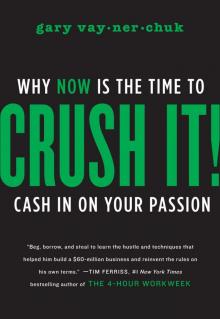 Crush It!
Crush It!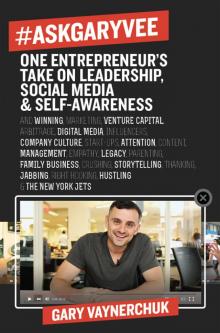 #AskGaryVee
#AskGaryVee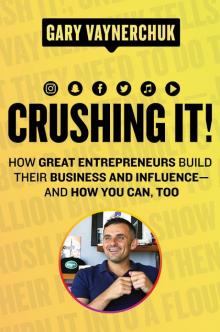 Crushing It! EPB
Crushing It! EPB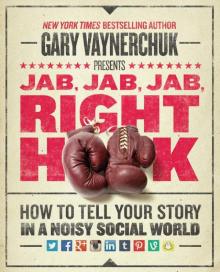 Jab, Jab, Jab, Right Hook
Jab, Jab, Jab, Right Hook